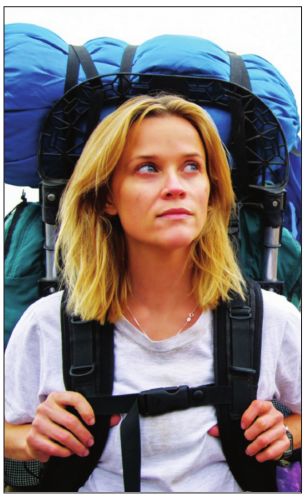
There are many ways that Jean-Marie Vallee’s adaptation of Cheryl Strayed’s memoir Wild could have gone wrong. A story anchored more by internal struggles than external conflict, this is the sort of insular story that’s often difficult to present in a film, with directors often falling back on melodramatic methods when all else fails. Fortunately, Vallee is better than that as he stays true to the spirit of Strayed’s book, never resorting to a maudlin approach or manipulative moments, resulting in a delicate tale, powerfully told.
In a personal tailspin, Strayed decided to walk the Pacific Crest Trail on her own, a journey that would take her over three months to complete, going from the high desert to the snow-covered mountains while covering over 1,100 miles. While her intentions are sincere, it becomes evident early on that she’s bitten off far more than she can chew. Covering only seven miles her first day, Strayed is unable to light a fire to warm her food, is spooked by rabbits and comes to realize that her boots are too large for her, which will lead to dire circumstances.
And while these challenges are not easily solved they pale in comparison to the reasons Strayed’s undertaken this journey. Spiraling out of control since her mother’s death at 45 to cancer, the young woman begins a life of sexual promiscuity and drug abuse that leads to the destruction of her marriage. Alone and desperate, she decides to “walk myself back to the woman my mother thought I was” by undertaking this meditative journey that she hopes will make her whole.
Vallee and his cinematographer Yves Belanger capture the beauty of the trail even when it’s at its most dangerous, a vital component if we are to believe Strayed’s environment would have any effect on her. If anything, this is a commercial for the Pacific Crest Trail and hopefully the many hikers who will set out to follow in Strayed’s footsteps will not sully it. Instead of presenting the latest special effects extravaganza on IMAX and other extralarge screens, this is the sort of breathtaking filmmaking that should be seen in that format to do justice to its beauty.
However, creating a travelogue is the easy part. Presenting Strayed’s transformation in a gradual convincing manner is where the true difficulty lies and Vallee’s approach is made to order. Utilizing flashbacks throughout, we’re able to see how close Strayed was to her mother Bobbi (a great Laura Dern) and why her death devastated her so, as well as the young woman hitting bottom once her self-destructive behavior takes its toll. Credit editors Martin Pensa and Vallee for their rapid-fire visuals when these memories are triggered as we see one thought lead to another in the blink of an eye and much like our own minds do, the film quickly jumps from the inconsequential to the core of our heroine’s troubles.
Initially, casting Reese Witherspoon in the lead role seems like a gimmick, an actress trying much too hard to change her demure image. However, it never feels that way and credit must be given to the actress as she digs deep, bringing to the fore this woman’s pain and desire to be whole again, never pleading with the audience to believe her or sympathize with her character. This is portrayal shot through with honesty and sincerity and Witherspoon carries the film on her shoulders with nary a misstep.
Beautiful, haunting and moving, Wild is the sort of movie that sneaks up on you. As we come to admire Strayed, not just for her strength but in the way she honestly owns up to her faults, her pursuit for redemption and forgiveness becomes ours. As she heals, we come to evaluate our own shortcomings and long to make amends of our own. The cathartic experience that emerges from our identifying with her so intimately makes Wild not only one of the biggest surprises of 2014 but one of the best films of the year as well.
Contact Chuck Koplinski at [email protected]